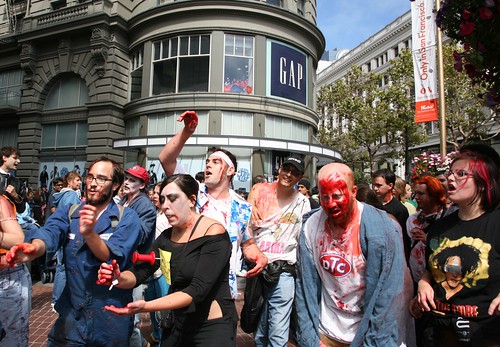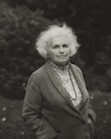A while back, we noted that vampire lit had–well, gone legit. (If you can major in it in college, it’s legit.) But it’s not just vampires. All kinds of characters previously relegated to genre writing–zombies, werewolves, and monsters galore–have migrated into mainstream literature. Can we blame this on Twilight, or is something bigger at work here?
Harldy, says Joe Fassler in The Atlantic, offering several reasons “literary” fiction has turned towards genre:
There was a time in recent memory when writers took their cues primarily from the literary figures that came before them. But in 2011, our literary, media, and entertainment landscapes are unprecedentedly vast and various. Not only that, but appropriation has become an important artistic currency—seen in everything from hip-hop sampling, to Internet remixing, to literary mashups like Pride and Prejudice and Zombies. We define our current cultural moment in terms of media consumption, and we try to reflect our varied interests in our art. In the hands of pop culture wizards like Jonathan Lethem or the late David Foster Wallace, you’re likely to see prose equally indebted to Catwoman and Catullus, Star Wars and Keats’ “Bright Star.”
Colson Whitehead told me that he thinks we’re seeing the first tremors in a seismic shift of influences. In his view, novelists and short-story writers working today are no longer afraid to embrace the pop cultural influences that excited them as kids. He remembers growing up when VCRs were a hot new thing, and renting horror movies on Friday nights was a part of his childhood education. For him, writing genre acknowledges influences that were always there—his love for comic books as well as literary books.
On The Millions, Kim Wright examines the same issue:
Once upon a time, genre was treated as almost a different industry from literary fiction, ignored by critics, sneered at by literary writers, relegated by publishers to imprint ghettos. But the dirty little and not-particularly-well-kept secret was that, thanks to the loyalty of their fans and the relatively rapid production of their authors, these genre books were the ones who kept the entire operation in business. All those snobbish literary writers had better have hoped like hell that their publishers had enough genre moneymakers in house to finance the advance for their latest beautifully rendered and experimentally structured observation of upper class angst.
But while genre authors were always the workhorses of publishing, lately they’ve broken out as stars and are belatedly receiving real recognition. In 2010, there were 358 fantasy titles on the best seller list, more than double the number in 2006. Publishers, always the last to recognize a literary trend, are pursuing top genre writers who, for the first time, have not only bigger paychecks but genuine clout.
I’d also argue that the rise of vampire/zombie/[insert monster here] writing is a pretty clear sign that it’s not the subject that matters; it’s the quality of the writing. Bad writing about vampires gets called “genre,” but good writing about vampires gets called “literature.” In a way, it’s a democratization of literary subjects–fantastical creatures and topics and worlds are no longer off-limits to “serious” writers.
Or, to put it another way: remember the popular kids in junior high, how sometimes they’d wear stuff that you thought was weird, but pretty soon, everyone was wearing it? It’s kind of like that. Good writers can write about anything and make it seem cool.
Further Reading:
- In an interview with Lauren Hall, Janice Eidus discusses the vampire myth–and why vampires are people, too.
- What do you do when you’re pegged into a particular genre? Fred Chappell gives some advice.
- In The Atlantic, Colson Whitehead talks about his new novel, Zone One, and why he chose to write a “zombie story”
- Find out how you can earn a degree in vampire studies (no kidding)






